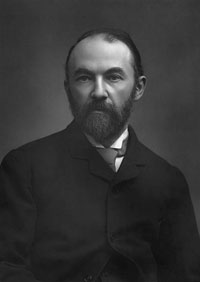Rearranging the Poem

Source: Herbert Rose Barraud00, Portrait of Thomas Hardy, Wikimedia
“It is a foolish thing,” said I,
“To bear with such, and pass it by;
Yet so I do, I know not why!”
And at each clash I would surmise
That if I had acted otherwise
I might have saved me many sighs.
But now the only happiness
In looking back that I possess—
Whose lack would leave me
comfortless—
Is to remember I refrained
From masteries I might have gained,
And for my tolerance was disdained;
For see, a tomb. And if it were
I had bent and broke, I should not dare
To linger in the shadows there.
Some poems have sentences within their stanzas, but you can’t assume that each stanza is always going to be one sentence.
Reread Hardy’s poem. Notice it has five stanzas. Now count how many complete sentences the poem has;
do you see four?
Rearrange the poem into four numbered sentences. Type your answer using your notes. When you're finished, check your understanding.
Sample Responses:
When you rearrange the poem into four sentences, it should look like this. The slashes remind you where each line in the poem ends.
- “It is a foolish thing,” said I, / “To bear with such, and pass it by; / Yet so I do, I know not why!” /
- And at each clash I would surmise / That if I had acted otherwise / I might have saved me many sighs.
- But now the only happiness / In looking back that I possess— / Whose lack would leave me comfortless— / Is to remember I refrained / From masteries I might have gained, / And for my tolerance was disdained; / For see, a tomb.
- And if it were / I had bent and broke, I should not dare / To linger in the shadows there. /
Close
It is also a good idea at this point to check to see if there are any words in the poem you don’t understand and find their meanings. Maybe you don’t know the meanings of some of the words highlighted below. Reread the sentences and choose the best definition below for each highlighted word. Type your answers using your notes. When you’re finished, check your understanding.
- “It is a foolish thing,” said I, “To bear with such, and pass it by; Yet so I do, I know not why!”
- And at each clash I would surmise That if I had acted otherwise I might have saved me many sighs.
- But now the only happiness In looking back that I possess—Whose lack would leave me comfortless— Is to remember I refrained From masteries I might have gained, And for my tolerance was disdained; For see, a tomb.
- And if it were I had bent and broke, I should not dare To linger in the shadows there.
- Bear
a. Deal with difficulty b. Birth a child
- Clash
a. Conflict b. Loud sound
- Surmise
a. To shock b. To guess
- Refrained
a. Restrained or curbed b. Sang a verse in a song
- Masteries
a. Powerlessness b. Superiority
- Disdained
a. Scorned b. Honored
- Linger
a. Slow in leaving b. Rushing away
Sample Responses:
1a, 2a, 3b, 4a, 5b, 6a, 7a
Close